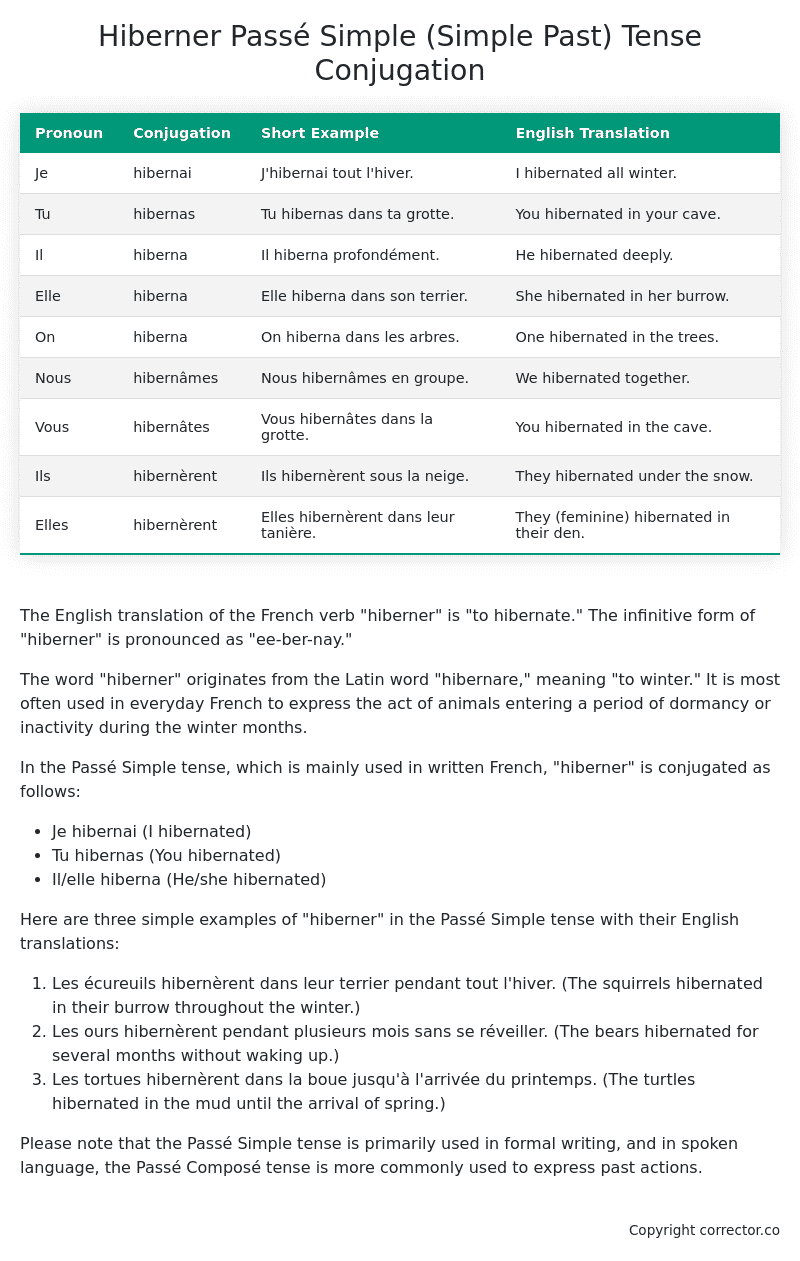Passé Simple (Simple Past) Tense Conjugation of the French Verb hiberner
Introduction to the verb hiberner
The English translation of the French verb “hiberner” is “to hibernate.” The infinitive form of “hiberner” is pronounced as “ee-ber-nay.”
The word “hiberner” originates from the Latin word “hibernare,” meaning “to winter.” It is most often used in everyday French to express the act of animals entering a period of dormancy or inactivity during the winter months.
In the Passé Simple tense, which is mainly used in written French, “hiberner” is conjugated as follows:
- Je hibernai (I hibernated)
- Tu hibernas (You hibernated)
- Il/elle hiberna (He/she hibernated)
Here are three simple examples of “hiberner” in the Passé Simple tense with their English translations:
- Les écureuils hibernèrent dans leur terrier pendant tout l’hiver. (The squirrels hibernated in their burrow throughout the winter.)
- Les ours hibernèrent pendant plusieurs mois sans se réveiller. (The bears hibernated for several months without waking up.)
- Les tortues hibernèrent dans la boue jusqu’à l’arrivée du printemps. (The turtles hibernated in the mud until the arrival of spring.)
Please note that the Passé Simple tense is primarily used in formal writing, and in spoken language, the Passé Composé tense is more commonly used to express past actions.
Table of the Passé Simple (Simple Past) Tense Conjugation of hiberner
| Pronoun | Conjugation | Short Example | English Translation |
|---|---|---|---|
| Je | hibernai | J’hibernai tout l’hiver. | I hibernated all winter. |
| Tu | hibernas | Tu hibernas dans ta grotte. | You hibernated in your cave. |
| Il | hiberna | Il hiberna profondément. | He hibernated deeply. |
| Elle | hiberna | Elle hiberna dans son terrier. | She hibernated in her burrow. |
| On | hiberna | On hiberna dans les arbres. | One hibernated in the trees. |
| Nous | hibernâmes | Nous hibernâmes en groupe. | We hibernated together. |
| Vous | hibernâtes | Vous hibernâtes dans la grotte. | You hibernated in the cave. |
| Ils | hibernèrent | Ils hibernèrent sous la neige. | They hibernated under the snow. |
| Elles | hibernèrent | Elles hibernèrent dans leur tanière. | They (feminine) hibernated in their den. |
Other Conjugations for Hiberner.
Le Present (Present Tense) Conjugation of the French Verb hiberner
Imparfait (Imperfect) Tense Conjugation of the French Verb hiberner
Passé Simple (Simple Past) Tense Conjugation of the French Verb hiberner (You’re reading it right now!)
Passé Composé (Present Perfect) Tense Conjugation of the French Verb hiberner
Futur Simple (Simple Future) Tense Conjugation of the French Verb hiberner
Futur Proche (Near Future) Tense Conjugation of the French Verb hiberner
Plus-que-parfait (Pluperfect) Tense Conjugation of the French Verb hiberner
Passé Antérieur (Past Anterior) Tense Conjugation of the French Verb hiberner
Futur Antérieur (Future Anterior) Tense Conjugation of the French Verb hiberner
Subjonctif Présent (Subjunctive Present) Tense Conjugation of the French Verb hiberner
Subjonctif Passé (Subjunctive Past) Tense Conjugation of the French Verb hiberner
Subjonctif Imparfait (Subjunctive Imperfect) Tense Conjugation of the French Verb hiberner
Subjonctif Plus-que-parfait (Subjunctive Pluperfect) Tense Conjugation of the French Verb hiberner
Conditionnel Présent (Conditional Present) Tense Conjugation of the French Verb hiberner
Conditionnel Passé (Conditional Past) Tense Conjugation of the French Verb hiberner
Conditionnel Passé II (Conditional Past II) Tense Conjugation of the French Verb hiberner
L’impératif Présent (Imperative Present) Tense Conjugation of the French Verb hiberner
L’impératif Passé (Imperative Past) Tense Conjugation of the French Verb hiberner
L’infinitif Présent (Infinitive Present) Tense Conjugation of the French Verb hiberner
L’infinitif Passé (Infinitive Past) Tense Conjugation of the French Verb hiberner
Le Participe Présent (Present Participle) Tense Conjugation of the French Verb hiberner
Le Participe Passé (Past Participle) Tense Conjugation of the French Verb hiberner
Struggling with French verbs or the language in general? Why not use our free French Grammar Checker – no registration required!
Get a FREE Download Study Sheet of this Conjugation 🔥
Simply right click the image below, click “save image” and get your free reference for the hiberner Passé Simple tense conjugation!

Hiberner – About the French Passé Simple (Simple Past) Tense
Formation
Usage
Narration
Historical Context
Interactions with other tenses
Passé Composé
Imparfait
Conditional and Subjunctive
Summary
I hope you enjoyed this article on the verb hiberner. Still in a learning mood? Check out another TOTALLY random French verb conjugation!


